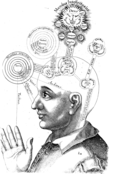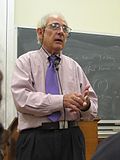Consciousness
Consciousness means being awake, alert and responsive to the environment.[1] The definition of consciousness may differ in psychology, neuroscience, philosophy and other related sciences. It is often disputed amongst academics and scientists.[2]
Consciousness is a range of mental states. There are several states between a fully conscious state and a fully unconscious state.[3] In medicine, the degree of loss of consciousness is measured by using Glasgow Coma Scale (GCS); a score between 3 and 15 is given to each person at any time, to show how conscious the person is. Higher scores show more conscious states.
It seems that many decisions are made without us being aware of it. Some think that these decisions are made by what is called the unconscious mind. There are also many body functions which we do not notice until they go wrong. These activities are done by the autonomic nervous system. Breathing and the beat of one's heart can be noticed but are controlled by nervous system without thought.
It is not known what causes consciousness. So, it is difficult to know if another person or thing is indeed conscious.[4] The best we can say is that some animals do seem to be conscious of the world around them. We ourselves assume that others have consciousness, but this is notoriously difficult to prove. This is known in philosophy as the problem of other minds.
Consciousness Media
Representation of consciousness from the 17th century by Robert Fludd, an English Paracelsian physician
John Locke, a 17th-century British Age of Enlightenment philosopher
Illustration of mind–body dualism by René Descartes. Inputs are passed by the sensory organs to the pineal gland, and from there to the immaterial spirit.
The Necker cube, an ambiguous image
Mirror test subjected on a common octopus
Schema of the neural processes underlying consciousness, from Christof Koch A Buddhist monk meditating
Thomas Nagel argues that while a human might be able to imagine what it is like to be a bat by taking "the bat's point of view", it would still be impossible "to know what it is like for a bat to be a bat". (Townsend's big-eared bat pictured.)
References
- ↑ Dorland, W.A. Newman (1981). Dorland's Illustrated Medical Dictionary (29th ed.). WB Saunders. ISBN 0-8089-2186-X
- ↑ Velmans, Max (2009). "How to define consciousness - and how not to define consciousness" (PDF). Journal of Consciousness Studies. 16 (5): 139–156.
- ↑ Tart, Charles R. 1975. States of consciousness. NY: Dutton, p51–62.
- ↑ How doctors peer into the minds of vegetative patients; communicating with patients who appear to lack consciousness is becoming a reality May 2014 issue Scientific American








